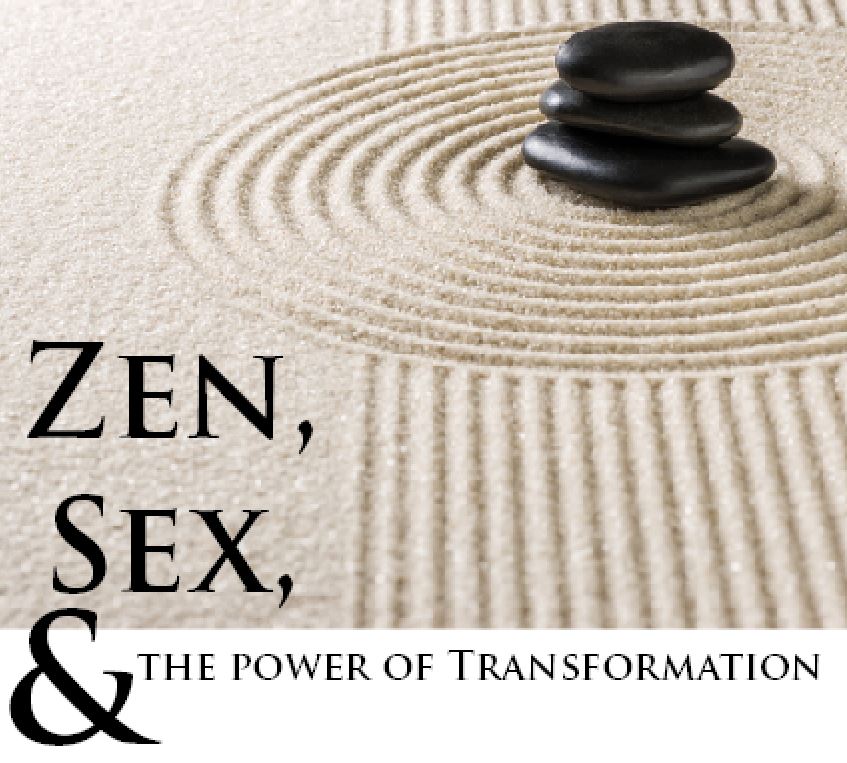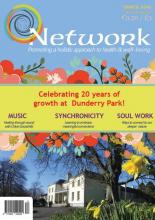Zen, Sex, and the Power of Transformation

In the summer of 2007, I was at a spirituality conference centered on the philosopher Ken Wilber’s work. At one point we were asked to split into quads, and for each person to answer a seemingly simple question: Why are you here?
I was placed in a group with a young man about my age, a Zen teacher I knew named Diane Hamilton, and an older man who I’d never met before. The latter had a shaved head and piercing, blue eyes. We sat in four chairs, and he was directly across from me.
‘Yeah’ he said, his voice low and gravelly. ‘I’ll go first’. He took a moment to make eye contact with all three of us. ‘So they call me Jun Po [pronounced June Poe] these days. I’m supposed to be some kind of roshi, I suppose’. He chuckled a little.
I raised my eyebrows. I’d actually never met a roshi in-person, although I’d spent the better part of a decade studying under Vajrayana Buddhist teacher named Lama Tsering Everest.
‘So, a few years ago, I started fucking somebody I shouldn’t have been fucking’ he stated flatly, seemingly not concerned at dropping two F-bombs or in leading with such a loaded sentence. We all sat up.
‘A priest in my order’ he continued, not breaking eye contact with us. ‘And I fucked up her marriage, my relationship to my partner, and my entire community. I nearly destroyed everything that I had spent 20 years building. And I realized that at 64 years of age, I still had some more self shit to do, and so it was back to the therapist’. He paused again, looking at each one of us. ‘So I’m here to see if Integral can explain just what the hell happened to me’.
I could hardly believe my ears. Spiritual teachers are notorious for excusing sexual indiscretion through a lot of doublespeak and bypassing of responsibility. At a minimum they tend to press for less than full ownership on their parts, and play up the extenuated circumstances.
Jun Po didn’t elaborate. He was finished, and he looked to Diane to go next. She, like the rest of us, seemed a little overwhelmed at his honesty and means of expression. Buddhists, after all, can be reserved with things like cursing or overt expressions of sexuality. He’d managed both in less than 50 words.
I didn’t know who this Jun Po was, but curious to find out. Over the next two years I would spend a great deal of time with him. He was in the middle of developing something he called Mondo Zen, which was his attempt to explain and understand his own problematic behavior. Back in those days he was offering his students a living experiment, slowly refining a method of updated, classic Zen koans designed to bridge the gap between classical Zen and modern, Western life.
In traditional Rinzai Zen, there are hundreds and hundreds of classical koans, designed to stump a student, to create an impasse through a question that can only be answered from a place of deeper insight. These koans can take years, even decades, to master and understand fully, with the emphasis not on the ‘right’ answer but rather on the answer coming from the right depth of mind.
Jun Po had been trained classically, and was a Rinzai Zen master in the classic, Japanese sense. But he also saw that those koans, while perfect in Japan generations before, were problematic in a completely different culture with very different cultural norms. He was an example of why they didn’t fully work, for those classical koans had deepened his insight but had failed to touch a lot of the psychological shadow that had formed from the abuse he experienced as a child. He was able to transcend his egoic contractions but not to transform them, or to understand them. Something was missing.
Jun Po Denis Kelly received his Zen Masters recognition in 1992. He was Vice Abbot and head monk as well as resident yoga teacher at Dai Bosatsu Zendo Kong Ji in the Catskill Mountains in New York state from 1987 through 1993. His Inka Zen lineage is in the Rinzai tradition, through Eido Shimano Roshi of the The Zen Studies Society. His yoga lineage is that of BKS Iyengar and Patabi Jois. Jun Po has been practicing, studying and teaching Zen and Yoga for most of his adult life.
In one conversation I had with him back then, he looked at me bluntly. ‘Listen’ he said, ‘Zen is perfect. It’s absolutely perfect for waking you up to your true nature, and for letting you grow up into your full emotional expression’. He paused, and the twinkle in his eye told me to hold my tongue. ‘If you live in 17th Century Japan. But by today’s standards, traditional Zen is autocratic, xenophobic, sexist, rigid, hierarchical, and patriarchal, just to name a few problems when viewed through a 21st Century, Western lens. And — and — there’s real magic there, too. Zen works, in so many ways. It’s a brilliantly refined science of Awakening, honed over a millennia. So how does one keep what works, and update what doesn’t?’
As Mondo Zen was being created and tested to see if it could answer this question, in the summer of 2009, Jun Po surprised me with an offer to write his life’s story. That story would become the award-winning A Heart Blown Open, thick with horrific abuse in an alcoholic home in the American Midwest, running from that life and into the counterculture of the 1960s, becoming a major manufacturer of high-quality LSD from the late 60s through the mid 70s, life on the run and then in a federal prison, and then finally spending 6 years in a Zen monastery and the very affair that had so intrigued me at our first meeting. It was the inside story of how one teacher was attempting, based on his own life’s experience, to refine an ancient and powerful and deeply respected practice: Rinzai Zen.
His life, up his becoming a lineage holder, had been a quest to understand himself and his world. In 1992, he became first dharma heir of Eido Shimano Roshi. Yet only a year later he resigned in protest due to Eido Roshi’s continued problematic sexual behavior. Ten years later, Jun Po himself stumbled and fell in a manner similar to his teacher. His life from 1992 until I’d met him, some 15 years later, was centered around answer a different question than the one that had driven him to the monastery.
How come, after decades of practice, real wisdom and compassion were not ruling his life, directing his behavior, and transforming lust, violent anger, jealousy, envy? How could love and compassion not hold in the face of his internal conflict? He could remain non-reactive in the face of these things, mind you, but it was a very repressive energy that was required. And his negative emotions still flourished, and they would sometimes overpower his discipline and insight. Why? How? He didn’t know, but he saw similar problems in his own teacher, and in many of the men and women at the monastery. When his affair broke into the open and nearly destroyed his community, he finally found the missing pieces he’d lacked, and Mondo Zen was born.
Today, Mondo Zen is a 16-koan practice that aims to demonstrate the depth of mind accessible in every moment, and the necessity for understanding and transforming emotional reactivity into loving-compassion and deep insight.
Mondo Zen combines the best of Zen’s meditative insight with philosophical reorientation and cutting-edge emotional intelligence. It uses meditative insight to show that so-called ‘negative’ emotions, such as anger, shame, jealousy, or envy, are really reactions to deeper feelings. If we can slow our minds down enough, we can see these deeper feelings and then choose our reaction to them, instead of becoming emotionally reactive.
The idea of Mondo Zen is three-fold: First - to give us the experience that what we seek is within us in this very moment (genuine spiritual insight). Secondly – to help to shift our perspective to understand the deeper nature of our so-called problematic emotions, so that when emotions arise we can experience the deeper truth of the feeling. And lastly, with training, to use our ‘problematic’ emotions to call to our newly-experienced and understood Awakened mind. Our angst becomes our liberation, as Jun Po likes to say.
Mondo Zen, then, is about a radical empowerment of the practitioner, and the radical responsibility that comes from truly understanding the nature of one’s mind, and one’s conditioned reactivity. The ability to choose creates new opportunities to impact life-long habits and deep family karmas, so that compassion and wisdom are united inside the heart of a practitioner, and flowing out through their actions.
In 2013 Jun Po returned to Dai Bosatsu to lead his first retreat there in 20 years. Two years later he helped to organize a gathering in New York City where Eido Shimano Roshi offered his first public apology to the community, and received impact from his current and former students.
The man who once told me that prison was a far better place to practice the dharma than a monastery had finally solved the riddle of himself. His story was, and continues to be the most remarkable one I’ve ever encountered.
Keith Martin-Smith is an award-winning author, consultant, and Zen priest. He is passionate about human connection, creativity, and evolution. He is the author of ‘A Heart Blown Open: The Life & Practice of Zen Master Jun Po Denis Kelly Roshi’.
Latest Issue
Upcoming Events
-
17/04/2020 to 26/04/2020
-
18/04/2020
-
23/04/2020
-
15/05/2020 to 23/05/2020
-
16/05/2020 to 17/05/2020
Recent Articles
Article Archive
- May 2017 (4)
- June 2017 (11)
- July 2017 (7)
- August 2017 (2)
- September 2017 (1)
- October 2017 (3)
- November 2017 (4)
- December 2017 (3)
- April 2018 (2)
- June 2018 (2)

